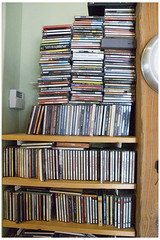
A topic we've discussed a few times before emerges again. Overly compressed digital audio is a bane of our modern existence, or something like that. You'd think a few artists with the status to release their music how they like it would be able to correct this aberration, but apparently not. Another reason the music labels are doomed.

Over the past decade and a half, a revolution in recording technology has changed the way albums are produced, mixed and mastered — almost always for the worse. "They make it loud to get [listeners'] attention," Bendeth says. Engineers do that by applying dynamic range compression, which reduces the difference between the loudest and softest sounds in a song. Like many of his peers, Bendeth believes that relying too much on this effect can obscure sonic detail, rob music of its emotional power and leave listeners with what engineers call ear fatigue. "I think most everything is mastered a little too loud," Bendeth says. "The industry decided that it's a volume contest."Not to say we don't love some aspects of the digital music revolution, we love having access to everything all the time, just wish CDs were mastered to include more breathing space between instruments.
Producers and engineers call this "the loudness war," and it has changed the way almost every new pop and rock album sounds. But volume isn't the only issue. Computer programs like Pro Tools, which let audio engineers manipulate sound the way a word processor edits text, make musicians sound unnaturally perfect. And today's listeners consume an increasing amount of music on MP3, which eliminates much of the data from the original CD file and can leave music sounding tinny or hollow. "With all the technical innovation, music sounds worse," says Steely Dan's Donald Fagen, who has made what are considered some of the best-sounding records of all time. "God is in the details. But there are no details anymore."
The idea that engineers make albums louder might seem strange: Isn't volume controlled by that knob on the stereo? Yes, but every setting on that dial delivers a range of loudness, from a hushed vocal to a kick drum — and pushing sounds toward the top of that range makes music seem louder. It's the same technique used to make television commercials stand out from shows. And it does grab listeners' attention — but at a price. Last year, Bob Dylan told Rolling Stone that modern albums "have sound all over them. There's no definition of nothing, no vocal, no nothing, just like — static."
[From The Death of High Fidelity : Rolling Stone]

